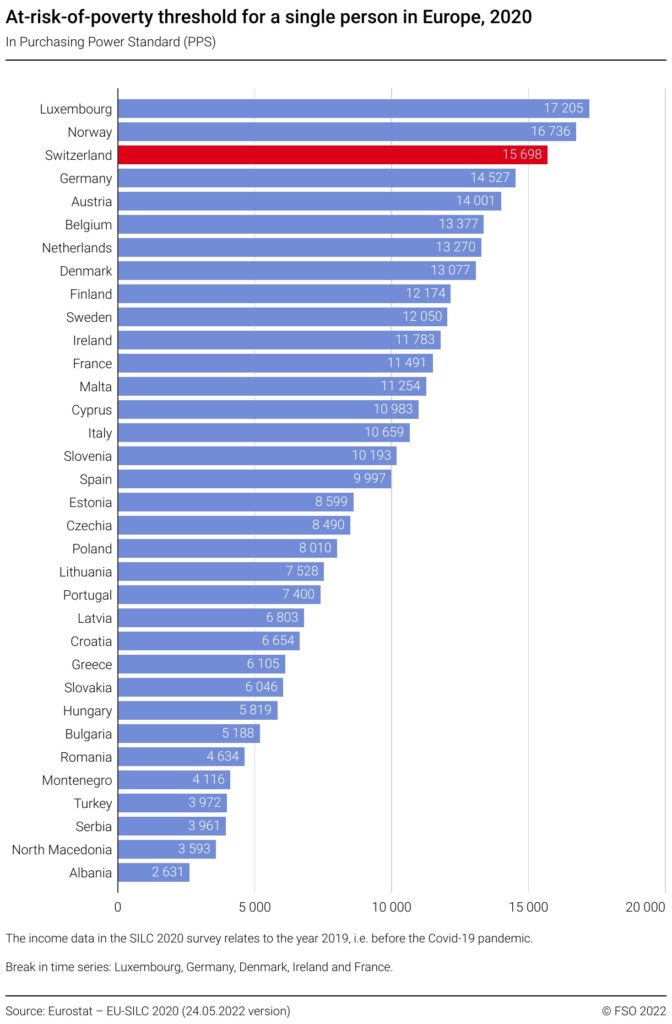What can you do if you don't earn enough to support yourself in Switzerland?

Switzerland is an expensive country, and making ends meet at the end of each month can sometimes be a struggle. But there is help for those who don’t have enough money to support themselves.
Switzerland’s wages are high, and most people who work here full time manage to have a decent standard of living.
But that is not the case for everyone.
Figures from the Federal Statistical Office (FSO) indicate that about 8.5 percent of Switzerland’s population live under the official poverty threshold, which is defined at receiving 2,279 francs per month on average for a single person, and 3,976 francs per month for two adults and two children.
Obviously, this is much more of a problem for people living in high-cost cities like Zurich and Geneva, than for those in rural areas where money goes much farther.
Overall, however, Switzerland’s population has one of the lowest risks of becoming poor — due mostly to low unemployment and relatively high wages — along with other high-income countries like Norway and Luxembourg, according to this FSO chart:

However, this comparison (which dates from 2020 but is still valid today), is not much of a relief to people who are facing financial hardship in Switzerland: mostly single parents, low-income households with children, persons working part-time, and people with no post-compulsory education (that is, without vocational training or university degree).
Also, immigrants are more impacted than the Swiss.
Needless to say, those who don’t work at all are worst off, but we are focusing on people who are employed, but struggling with costs.
What can you do if you fit into this category and can’t afford the high cost of living in Switzerland?
This is obviously an unenviable situation, but there are some ways to cut your expenses and relieve money woes at least a bit:
Health insurance premiums
Of all the fixed costs all Swiss residents must pay, health insurance is among the highest — and, to make the matters worse, it is likely to increase in 2024.
READ ALSO: Why is Swiss health insurance set to get more expensive?
Depending on the amount of your deductible and the canton where you live, you are likely to spend a big chunk of your budget on this mandatory expense.
However, help is available.
If you can’t afford to pay the high price of healthcare premiums, you could be eligible to have your premiums subsidised by the government.
This also applies to families with several children.
Swiss law “provides for federal and cantonal subsidies to reduce premiums for people on low incomes," according to the Federal Office of Public Health (FOPH).
In addition, “the cantons are required to reduce premiums for children in low- and middle-income families by at least 80 percent; premiums for young adults in education/training will continue to be reduced by at least 50 percent".
Many cantons notify those entitled to subsidies automatically, based on the income tax filed each year. In others, you must apply for the reduction yourself by contacting the appropriate agency.
What about rent and other necessities?
You will not get specific government subsidies, but if you are eligible for social assistance, you will receive money to cover (in part) your housing, food, and other basic living costs.
If you don’t qualify for welfare but encounter an unexpected, but temporary, financial setback, you may still receive short-term ‘emergency’ help.
How much could you get?
According to the Swiss conference of social action institutions (CSIAS), these are the current amounts of monthly welfare payments:
1 person: 1,006 francs
2 people: 1,539 francs
3 people: 1,871 francs
4 people: 2,153 francs
5 people: 2,435 francs
On top of that, you will get about 1,000 francs for housing
To qualify for social assistance, you must meet certain criteria, the primary one being that you and your family are permanent residents and live under the official poverty threshold, as described above.
This means financial aid you receive will be in addition to your regular (low) wages.
There are, however, things you should keep in mind before you apply:
- You can’t own any assets, such as property, money in the bank, or cars (unless you need one for health reasons)
- If authorities deem your apartment to be too expensive, you must move to a cheaper one
- You must declare any additional income, including refunds of health costs, so your social benefits can be adjusted accordingly
- Once your financial situation improves, you could be held liable for reimbursing the state for the money your received
- Also, if you are a foreign national, keep in mind that receiving social assistance can prevent you from becoming a Swiss citizen — unless you reimburse all the money you owe
READ ALSO: Reader question: Can I still get Swiss citizenship after claiming social benefits?
Comments
See Also
Switzerland’s wages are high, and most people who work here full time manage to have a decent standard of living.
But that is not the case for everyone.
Figures from the Federal Statistical Office (FSO) indicate that about 8.5 percent of Switzerland’s population live under the official poverty threshold, which is defined at receiving 2,279 francs per month on average for a single person, and 3,976 francs per month for two adults and two children.
Obviously, this is much more of a problem for people living in high-cost cities like Zurich and Geneva, than for those in rural areas where money goes much farther.
Overall, however, Switzerland’s population has one of the lowest risks of becoming poor — due mostly to low unemployment and relatively high wages — along with other high-income countries like Norway and Luxembourg, according to this FSO chart:

However, this comparison (which dates from 2020 but is still valid today), is not much of a relief to people who are facing financial hardship in Switzerland: mostly single parents, low-income households with children, persons working part-time, and people with no post-compulsory education (that is, without vocational training or university degree).
Also, immigrants are more impacted than the Swiss.
Needless to say, those who don’t work at all are worst off, but we are focusing on people who are employed, but struggling with costs.
What can you do if you fit into this category and can’t afford the high cost of living in Switzerland?
This is obviously an unenviable situation, but there are some ways to cut your expenses and relieve money woes at least a bit:
Health insurance premiums
Of all the fixed costs all Swiss residents must pay, health insurance is among the highest — and, to make the matters worse, it is likely to increase in 2024.
READ ALSO: Why is Swiss health insurance set to get more expensive?
Depending on the amount of your deductible and the canton where you live, you are likely to spend a big chunk of your budget on this mandatory expense.
However, help is available.
If you can’t afford to pay the high price of healthcare premiums, you could be eligible to have your premiums subsidised by the government.
This also applies to families with several children.
Swiss law “provides for federal and cantonal subsidies to reduce premiums for people on low incomes," according to the Federal Office of Public Health (FOPH).
In addition, “the cantons are required to reduce premiums for children in low- and middle-income families by at least 80 percent; premiums for young adults in education/training will continue to be reduced by at least 50 percent".
Many cantons notify those entitled to subsidies automatically, based on the income tax filed each year. In others, you must apply for the reduction yourself by contacting the appropriate agency.
What about rent and other necessities?
You will not get specific government subsidies, but if you are eligible for social assistance, you will receive money to cover (in part) your housing, food, and other basic living costs.
If you don’t qualify for welfare but encounter an unexpected, but temporary, financial setback, you may still receive short-term ‘emergency’ help.
How much could you get?
According to the Swiss conference of social action institutions (CSIAS), these are the current amounts of monthly welfare payments:
1 person: 1,006 francs
2 people: 1,539 francs
3 people: 1,871 francs
4 people: 2,153 francs
5 people: 2,435 francs
On top of that, you will get about 1,000 francs for housing
To qualify for social assistance, you must meet certain criteria, the primary one being that you and your family are permanent residents and live under the official poverty threshold, as described above.
This means financial aid you receive will be in addition to your regular (low) wages.
There are, however, things you should keep in mind before you apply:
- You can’t own any assets, such as property, money in the bank, or cars (unless you need one for health reasons)
- If authorities deem your apartment to be too expensive, you must move to a cheaper one
- You must declare any additional income, including refunds of health costs, so your social benefits can be adjusted accordingly
- Once your financial situation improves, you could be held liable for reimbursing the state for the money your received
- Also, if you are a foreign national, keep in mind that receiving social assistance can prevent you from becoming a Swiss citizen — unless you reimburse all the money you owe
READ ALSO: Reader question: Can I still get Swiss citizenship after claiming social benefits?
Join the conversation in our comments section below. Share your own views and experience and if you have a question or suggestion for our journalists then email us at [email protected].
Please keep comments civil, constructive and on topic – and make sure to read our terms of use before getting involved.
Please log in here to leave a comment.